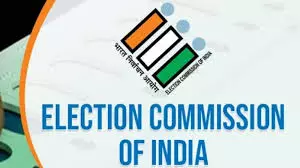Election Commission Decides to Link Electoral Rolls with RGI Database
The move is to obtain information with regard to deaths for faster and accurate updation of voters' lists

Election Commission (Image:DC)
New Delhi: The Election Commission has decided to link electoral rolls with the Registrar-General of India (RGI) database to obtain information with regard to deaths for faster and accurate updation of voters' lists. The poll body has also announced plans to modify the design of the voter information slips so that the serial number of the voter is displayed more prominently, with increased font size, making it easier for voters to identify their polling station and for polling officials to locate their names in the electoral roll efficiently.
The step to obtain death data electronically from the RGI comes after booth level officers (BLOs) complained that several family members did not report the death of voters. As a result, they were unable to delete the names of the deceased. There is always a possibility of misuse of such data in bogus voting.
The EC on Thursday said linking death data with the RGI database will help in faster and accurate updation of voters' list and will ensure that the electoral registration officers (EROs) receive timely information about registered deaths and allow BLOs to re-verify the information through field visits, without waiting for a formal request by the kin of the deceased. The poll panel has the authority under the Registration of Electors Rules 1960 and the Registration of Births and Deaths Act 1969 to seek such details.
As per law, registration of death within 21 days is mandatory. But since not all states have complete digital records available, sources said, this could be done in a phased manner. They added that the step has been taken in view of upcoming Bihar elections.
The RGI data comes from local bodies and hospitals where death is registered. However, an article in Economic and Political Weekly published in January this year said India’s death registration system faces significant challenges, including regional disparities, gender inequities and incomplete data capture. Addressing these issues through digitisation, awareness campaigns, streamlined processes and robust data integration is crucial for ensuring equitable health outcomes and evidence-based policymaking, the article added.
Giving details, the article said the regional divide in death registration rates is striking, as states like Kerala and Tamil Nadu have achieved far higher registration coverage. “Kerala, for example, has attained near-universal death registration through its robust health infrastructure and robust administrative practices. In contrast, others like Bihar and Nagaland continue to struggle with lower registration rates. Bihar grapples with infrastructural deficits and administrative inefficiencies that result in significantly lower registration rates,” the article said.
The EC has also directed that all BLOs should be issued standard photo identity cards to ensure that citizens can recognise and interact with them confidently during voter verification and registration drives. “As the first interface between the voters and the EC in performing election-related duties, it is important that BLOs are easily identifiable to the public while conducting house-to-house visits,” the poll body said.
The EC on Thursday said linking death data with the RGI database will help in faster and accurate updation of voters' list and will ensure that the electoral registration officers (EROs) receive timely information about registered deaths and allow BLOs to re-verify the information through field visits, without waiting for a formal request by the kin of the deceased. The poll panel has the authority under the Registration of Electors Rules 1960 and the Registration of Births and Deaths Act 1969 to seek such details.
As per law, registration of death within 21 days is mandatory. But since not all states have complete digital records available, sources said, this could be done in a phased manner. They added that the step has been taken in view of upcoming Bihar elections.
The RGI data comes from local bodies and hospitals where death is registered. However, an article in Economic and Political Weekly published in January this year said India’s death registration system faces significant challenges, including regional disparities, gender inequities and incomplete data capture. Addressing these issues through digitisation, awareness campaigns, streamlined processes and robust data integration is crucial for ensuring equitable health outcomes and evidence-based policymaking, the article added.
Giving details, the article said the regional divide in death registration rates is striking, as states like Kerala and Tamil Nadu have achieved far higher registration coverage. “Kerala, for example, has attained near-universal death registration through its robust health infrastructure and robust administrative practices. In contrast, others like Bihar and Nagaland continue to struggle with lower registration rates. Bihar grapples with infrastructural deficits and administrative inefficiencies that result in significantly lower registration rates,” the article said.
The EC has also directed that all BLOs should be issued standard photo identity cards to ensure that citizens can recognise and interact with them confidently during voter verification and registration drives. “As the first interface between the voters and the EC in performing election-related duties, it is important that BLOs are easily identifiable to the public while conducting house-to-house visits,” the poll body said.
( Source : Asian Age )
Next Story
